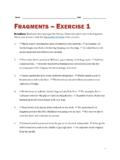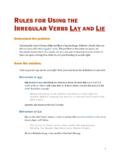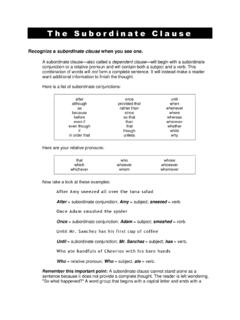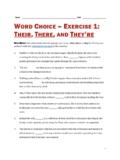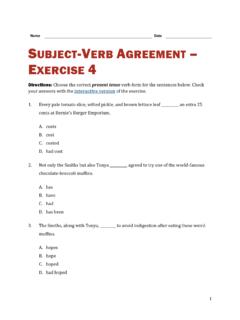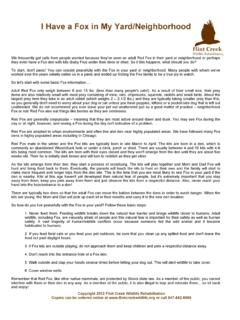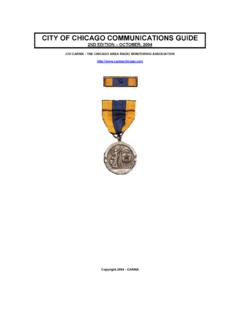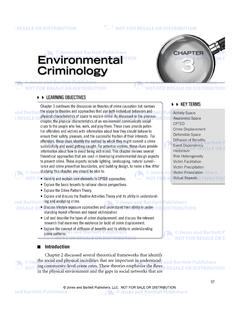Transcription of T he I nfi ni tive
1 T h e I n f i n i t i v e Recognize an infinitive when you see one. To sneeze, to smash, to cry, to shriek, to jump, to dunk, to read, to eat, to slurp all of these are infinitives. An infinitive will almost always begin with to followed by the simple form of the verb, like this: TO + VE R B = infinitive Important Note: Because an infinitive is not a verb, you cannot add s, es, ed, or ing to the end. Ever! Infinitives can be used as nouns, adjectives, or adverbs. Look at these examples: To sleep i s t he onl y t hi ng E li wa nt s af t er hi s do ub le s hi ft w ai ti ng ta ble s a t the nei gh b orho od c af . To sleep functions as a noun because it is the subject of the sentence. No ma t ter h ow fasc i na ti ng t he bi ol ogy di ssec ti on i s, E ma nue l turn s his he ad a nd re fu ses to look. To look functions as a noun because it is the direct object for the verb refuses. Wher ever M el iss a g o es, s he a lw ay s br ing s a b oo k to read in c ase c onver sa ti on lag s or she ha s a l on g w ai t.
2 To read functions as an adjective because it modifies book. R ic hard brav ed the i c y rai n to throw th e sme ll y s qui d e yeb a ll ste w i n to the ap art men t d ump s ter. To throw functions as an adverb because it explains why Richard braved the inclement weather. Recognize an infinitive even when it is missing the to. An infinitive will almost always begin with to. Exceptions do occur, however. An infinitive will lose its to when it follows certain verbs. These verbs are feel, hear, help, let, make, see, and watch. The pattern looks like this: SP E C I A L VE R B + DI R E C T OB J E C T + IN F I N I T I V E - TO Here are some examples: As s oo n a s T heo dor e felt the r ai n splatter on hi s ho t, d us ty ski n, h e k new t ha t h e ha d a g oo d exc use to re t urn the la wn mo wer to th e gar ag e. Felt = special verb; rain = direct object; splatter = infinitive minus the to. Whe n D ann y heard the alar m clock buzz, he s la ppe d t he sno oze b u tt on and b urrow ed und er t he c over s for te n mor e min ut es of s lee p.
3 Heard = special verb; alarm clock = direct object; buzz = infinitive minus the to. Alt ho ug h Dr. R i ble y spe nt an e xtr a c la ss peri od helping us underst and l og ari t hms, we st ill bo mbe d th e t es t. Helping = special verb; us = direct object; understand = infinitive minus the to. Bec au se Fr edd ie ha d never to uc he d a sna ke, I rem ove d the c o ver of t he c a ge a nd let him pet S que eze, m y se ven-f o ot py th on. Let = special verb; him = direct object; pet = infinitive minus the to. Sinc e J os e h ad d es tr oye d S ylv ia' s s po tle s s ki tc h en whi le b a ki ng c hoc ol at e-br oc c ol i muff in s, sh e made him t ake her ou t fo r an expe ns ive di nner. Made = special verb; him = direct object; take = infinitive minus the to. I sai d a pr ay er w hen I saw my friends mount the K um ba, a frigh te ni ng r oll er c o as ter tha t tw is ts an d rol ls l ik e a g ia n t s ea serpe n t. Saw = special verb; my friends = direct object; mount = infinitive minus the to.
4 Hop in g t o l ose her f ear of fl yin g, R ac he l wen t to the air por t to wat ch passeng er planes take off and land, bu t e ven th is exerc i se d id n o t c on vinc e her t ha t je ts were saf e. Watch = special verb; passenger planes = direct object; take, land = infinitives minus the to. To split or not to split? The general rule is that no word should separate the to of an infinitive from the simple form of the verb that follows. If a word does come between these two components, a split infinitive results. Look at the example that follows: W r o n g : Sara ho pes to quickly fini sh her c h em i str y hom ew ork so th at sh e c an re tur n t o t he more in tere st in g S tep he n King nov el she ha d t o aba nd on. R i g h t : Sara ho pes to finish h er c he mi str y h om ewor k quickly so th at sh e c an re turn t o t he m ore in tere st in g S tep he n King nov el she ha d t o aba nd on. Some English teachers believe that thou shall not split infinitives was written on the stone tablets that Moses carried down from the mountain.
5 Breaking the rule, in their eyes, is equivalent to killing, stealing, coveting another man's wife, or dishonoring one's parents. If you have this type of English teacher, then don't split infinitives! Other folks, however, consider the split infinitive a construction, not an error. They believe that split infinitives are perfectly appropriate, especially in informal writing. In fact, an infinitive will occasionally require splitting, sometimes for meaning and sometimes for sentence cadence. One of the most celebrated split infinitives begins every episode of Star Trek: "To boldly go where no one has gone before .." Boldly to go? To go boldly? Neither option is as effective as the original! When you are making the decision to split or not to split, consider your audience. If the piece of writing is very formal and you can maneuver the words to avoid splitting the infinitive, then do so. If you like the infinitive split and know that its presence will not hurt the effectiveness of your writing, leave it alone.
6 1997 - 2014 by Robin L. Simmons All Rights Reserved.
